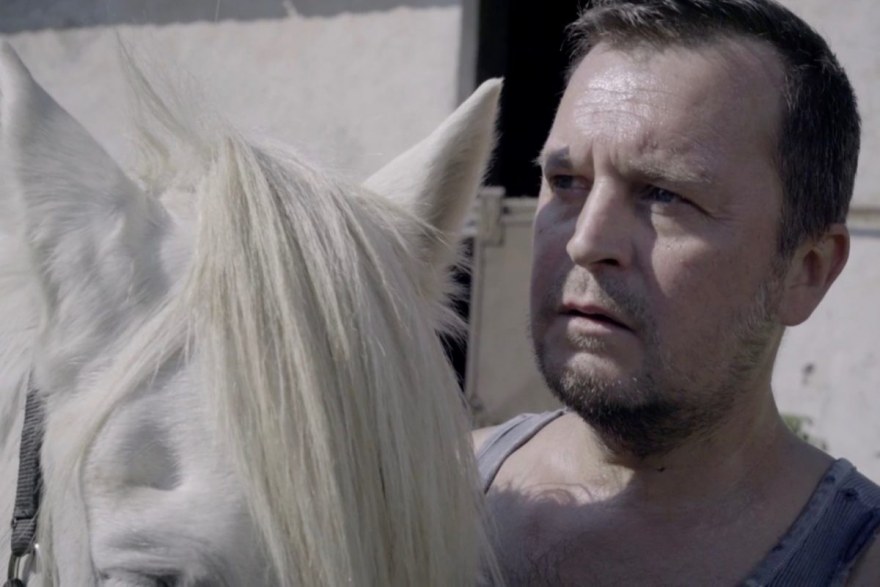Breakfast with Boomerang
An interview with David Bouttin, director of Boomerang
Unfortunately, the touching situation in which Paul finds himself is not unique. Was there a particular event that inspired the storyline of the film?
There was no particular event, just a set of circumstances and social injustice which touch me. Of course I thought of the people in Paris who have jobs, but have to sleep in their cars because they do not earn enough to pay for a place to live. I also thought about the book by Florence Aubenas, Les Quais de Ouistreham, which describes unemployed people working on ferry boats. They will accept anything just to earn a few extra euros each month – in order not to die, but to continue living. Living to work and on and on it goes. There is an absurdity in the contemporary world. It seems like we are more civilized, with an intelligent and critical view of the past. Yet we live in a feudal system, colonial, and enslaving. The powerful exploit the weak. In Boomerang, Paul is at the bottom even though he had always been a good soldier. He needs to find solutions to his problems. « One must imagine Sisyphus being happy », writes Albert Camus in The Myth of Sisyphus. This idea was also at the heart of the film. In his absurd life, Paul has no other choice but to move forward.
[SPOILER ALERT] Where did you get the idea for the horse?
A man having no other way to get to work than by horse is the big idea of the film, and it was the starting point. It’s like moving backward. So inconceivable and unacceptable in 2017. It’s an image from another time, the 19th century, and today, it seems inconceivable. I’m sure we would all be shocked to hear on the radio that near a factory, a horse was found because one of the workers had no other way to get to work than by horse. We would all be shocked, but we would not really be surprised.
Your previous short film tells the story of people who are victims of overwhelming socio-economic realities. What subjects will you explore next?
This subject especially moves me. Socio-economic realities are at the heart of the problem of our humanity. « Hate comes from the social hierarchy » sang the group Kanjar’Oc. All inequality in our society comes from the exploitation of man. These days, I am working on the screenplay of my first feature film. It will deal with this subject. The liberal economy is ruining human relationships. But it is also the logical next step after systems like slavery and colonialism. The world has changed and we must think differently, making human values our central priority. The economy should not be the only measuring stick of growth. In this sense, cinema is a good means of expression, since it allows us to add emotion to ideas and give sensitivity to a reality that is often too hard to accept.
You also make documentaries. Do you hope to focus on narratives more or will you continue to work in both formats?
I would indeed like to focus on narratives more, but the kind of narrative films that are never very far from documentaries — a « real » cinema, strongly inspired by society and human relations with a lot of research on the ground. What I love in narrative: the emotion of the actors, the freedom of the mise en scène, the creative process and the invention when writing the script. To capture reality, I like the idea of working with non-actors. I did this with Boomerang – the judge is a real-life lawyer, and the cleaning ladies are real cleaning staff on ferry boats.
Does the short format offer any particular freedom?
The short film lets you go straight to the heart of an idea. There is a piercing quality which I like. Its great freedom comes from it not being subjected to economic factors. But it must make due with smaller means of production. The greatest aspect of shorts is the energy with which people make them. We are a small crew with a tiny budget, but with grand ideas. It allows us to find the essence straightaway, in the writing, shooting, and editing. This is certainly the energy which must be kept for making features.
If you have been here before, tell us an anecdote about Clermont-Ferrand Film Festival. If not, what are your expectations?
I have never been to the city of Clermont-Ferrand, let alone the festival, so it will be a first for both. I was invited in 2015 for the film Je suis un Migrant, but I could not attend. I’m very happy to take part this year. Clermont-Ferrand had been my dream as a film student for a very long time. I’m hoping to meet some great people, and I also hope to be inspired. These are times to fill up with energy to take back with me to make more films.
To watch Boomerang, come to its screenings in the National Competition F2.








